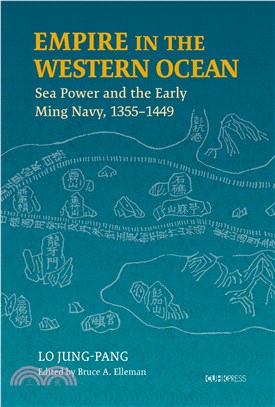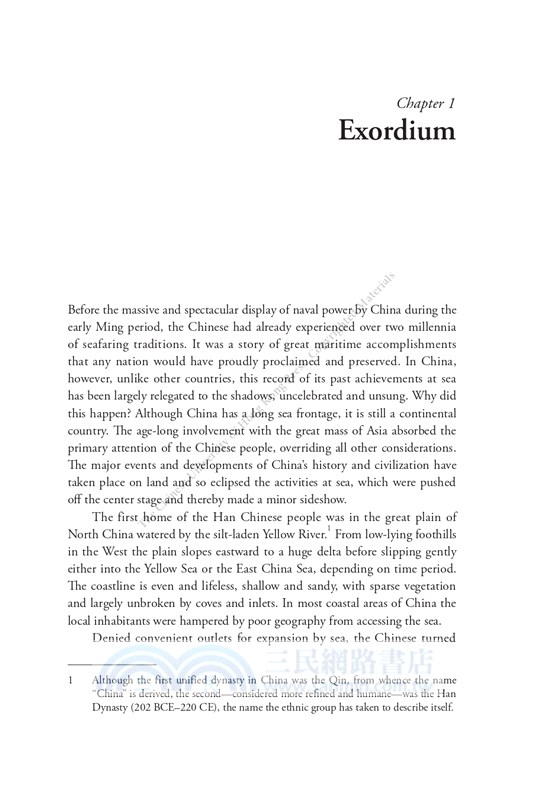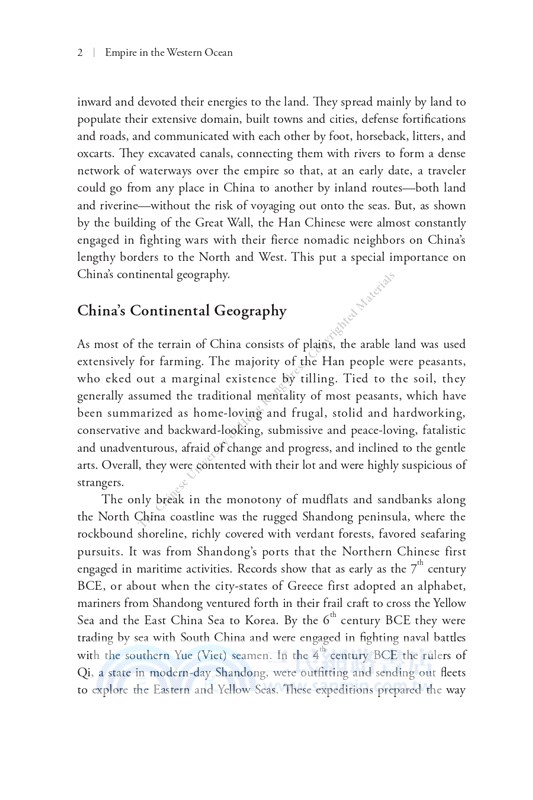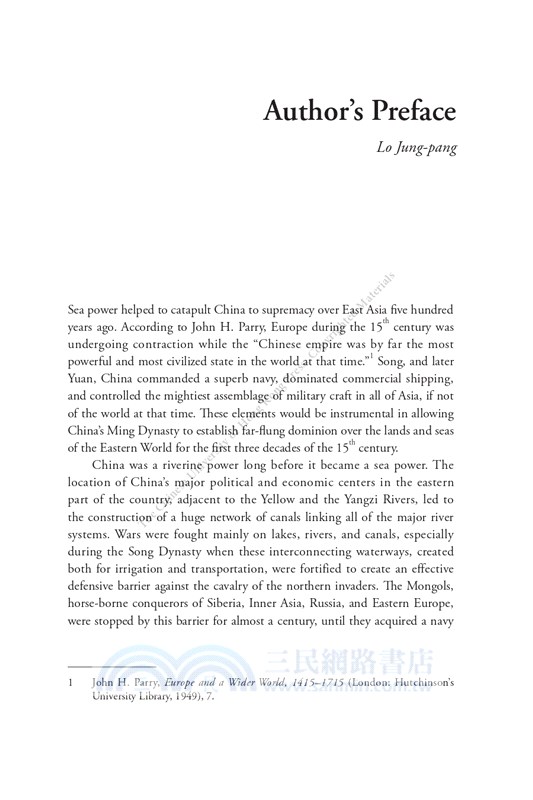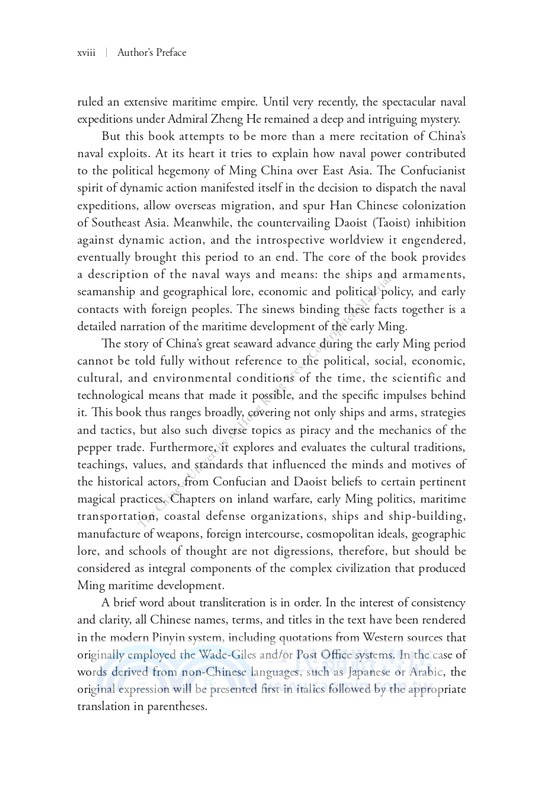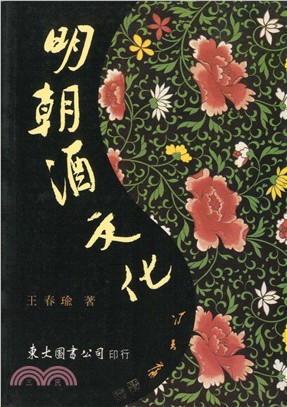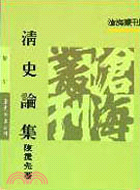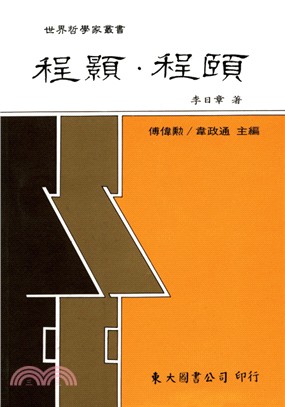Empire in the Western Ocean:Sea Power and the Early Ming Navy, 1355–1449
商品資訊
ISBN13:9789882372719
出版社:香港中文大學出版社
作者:Lo Jung-pang.Edited by Bruce A. Elleman
出版日:2023/03/01
裝訂/頁數:精裝/298頁
規格:23.7cm*15.6cm*2.5cm (高/寬/厚)
商品簡介
作者簡介
目次
相關商品
商品簡介
In this ground‐breaking, posthumous study, the late Lo Jung‐pang discusses the geographic, political,
and commercial factors that led to the emergence of seapower and a navy under the Ming. While
Zheng He and his seven expeditions have received some scholarly attention, few understand the long
history of maritime engagement which provided the nautical and technical background for these
voyages. The evolution of this maritime engagement and its extension into the Indian Ocean is the
focus of Lo’s still‐timely and highly significant work.
In addition to detailing the rise of the Ming navy and its extraordinary accomplishments, Lo also
examines some of the factors that led to the end of China’s first great maritime era: Why did China
suddenly seem to turn away from the seas? Were the military defeats in Annam and on the northern
borders significant in this? Or were financial pressures key?
Empire in the Western Ocean represents the most comprehensive and insightful English‐language
treatment to date of the evolution and activities of the early Ming navy. Moreover, it encourages
further inquiry into contemporary questions of China’s maritime aspirations.
‐‐‐‐‐‐‐‐‐‐‐‐‐‐
To aid the reader, a Foreword by Richard J. Smith discusses how Lo viewed the early Ming navy—not
simply in terms of its evolution and military strength, but also in terms of the commerce and shipping
that it promoted. This history is presented in the context of the centuries‐long shift of China’s
demographic center of gravity from the northwest to the southeast by the Song period (960–1279).
In the Afterword, Ming scholar Geoff Wade explains how the Ming rulers, eager to widely display their
legitimacy, sent military forces abroad, collected treasure for the imperial court, and urged rulers of all
known states to demonstrate their submission to the Ming court. He also shows how this often gave
rise to violence during the Ming expeditions.
and commercial factors that led to the emergence of seapower and a navy under the Ming. While
Zheng He and his seven expeditions have received some scholarly attention, few understand the long
history of maritime engagement which provided the nautical and technical background for these
voyages. The evolution of this maritime engagement and its extension into the Indian Ocean is the
focus of Lo’s still‐timely and highly significant work.
In addition to detailing the rise of the Ming navy and its extraordinary accomplishments, Lo also
examines some of the factors that led to the end of China’s first great maritime era: Why did China
suddenly seem to turn away from the seas? Were the military defeats in Annam and on the northern
borders significant in this? Or were financial pressures key?
Empire in the Western Ocean represents the most comprehensive and insightful English‐language
treatment to date of the evolution and activities of the early Ming navy. Moreover, it encourages
further inquiry into contemporary questions of China’s maritime aspirations.
‐‐‐‐‐‐‐‐‐‐‐‐‐‐
To aid the reader, a Foreword by Richard J. Smith discusses how Lo viewed the early Ming navy—not
simply in terms of its evolution and military strength, but also in terms of the commerce and shipping
that it promoted. This history is presented in the context of the centuries‐long shift of China’s
demographic center of gravity from the northwest to the southeast by the Song period (960–1279).
In the Afterword, Ming scholar Geoff Wade explains how the Ming rulers, eager to widely display their
legitimacy, sent military forces abroad, collected treasure for the imperial court, and urged rulers of all
known states to demonstrate their submission to the Ming court. He also shows how this often gave
rise to violence during the Ming expeditions.
作者簡介
Lo Jung‐pang (1912–1981) was the premier Western‐language historian of China’s maritime history. He
received his M.A. and Ph.D. degrees from the University of California, Berkeley. Before becoming a full
professor at the University of California, Davis in 1969, he had taught at Swarthmore College, the University
of Pennsylvania, the University of Michigan, and the University of Washington.
Lo’s scholarly interests were extraordinarily wide‐ranging in terms of both topics and chronological scope,
reflecting a command of several Western languages and an intimate acquaintance with Chinese sources
written over a period of more than two thousand years. Although he is best known for his many groundbreaking
contributions to China’s military and naval history, he also wrote on political and economic topics.
In addition, he produced a book titled K’ang Yu‐wei: A Biography and a Symposium which has been described
as “laying a new foundation for expanded studies of one of modern China’s authentic men of genius.” The
subject of that biography, Kang Youwei, was Lo’s grandfather.
Bruce A. Elleman is William V. Pratt Professor of International History, U.S. Naval War College, with a M.A.
in National Security and Strategic Studies, with Distinction (2004), U.S. Naval War College, and a Ph.D. in
History from Columbia University (1993). His specialization includes Chinese, Japanese, and Russian history,
East Asian international relations, Sino‐Soviet diplomatic history, and Chinese military history.
Richard J. Smith is George and Nancy Rupp Professor of Humanities Emeritus, and a Research Professor at
the Chao Center for Asian Studies, Rice University. His primary research focus is elite and popular culture in
Ming and Qing Dynasty China, but he also has strong interests in transnational, global, and comparative
studies.
Geoff Wade researches intra‐Asian connections and interactions, both historical and contemporary. He has
taught and researched at institutions in the PRC, Hong Kong, Malaysia, Singapore, and Australia.
received his M.A. and Ph.D. degrees from the University of California, Berkeley. Before becoming a full
professor at the University of California, Davis in 1969, he had taught at Swarthmore College, the University
of Pennsylvania, the University of Michigan, and the University of Washington.
Lo’s scholarly interests were extraordinarily wide‐ranging in terms of both topics and chronological scope,
reflecting a command of several Western languages and an intimate acquaintance with Chinese sources
written over a period of more than two thousand years. Although he is best known for his many groundbreaking
contributions to China’s military and naval history, he also wrote on political and economic topics.
In addition, he produced a book titled K’ang Yu‐wei: A Biography and a Symposium which has been described
as “laying a new foundation for expanded studies of one of modern China’s authentic men of genius.” The
subject of that biography, Kang Youwei, was Lo’s grandfather.
Bruce A. Elleman is William V. Pratt Professor of International History, U.S. Naval War College, with a M.A.
in National Security and Strategic Studies, with Distinction (2004), U.S. Naval War College, and a Ph.D. in
History from Columbia University (1993). His specialization includes Chinese, Japanese, and Russian history,
East Asian international relations, Sino‐Soviet diplomatic history, and Chinese military history.
Richard J. Smith is George and Nancy Rupp Professor of Humanities Emeritus, and a Research Professor at
the Chao Center for Asian Studies, Rice University. His primary research focus is elite and popular culture in
Ming and Qing Dynasty China, but he also has strong interests in transnational, global, and comparative
studies.
Geoff Wade researches intra‐Asian connections and interactions, both historical and contemporary. He has
taught and researched at institutions in the PRC, Hong Kong, Malaysia, Singapore, and Australia.
目次
Editor’s Preface Bruce A. Elleman / ix
Author’s Preface Lo Jung‐pang /xiii
Foreword Richard J. Smith/xix
1 Exordium /1
2 The Upsurge of the Red Turbans/29
3 The Battle of Poyang Lake and the Expulsion of the Mongols/49
4 Geographical Lore and Navigational Arts /69
5 Maritime Transportation and Coastal Defense /95
6 Ships and Armaments /113
7 Imperialism, the Chinese Variety /139
8 Steps to Pax Sinica /161
9 The Uneasy Peace with Japan and the War with Annam /181
10 A Spirit of Military and Economic Enterprise /197
Conclusion: The Decline of the Early Ming Navy /217
Afterword Geoff Wade /231
Appendices /255
Selected Bibliography /261
Biographies /271
Index /273
Author’s Preface Lo Jung‐pang /xiii
Foreword Richard J. Smith/xix
1 Exordium /1
2 The Upsurge of the Red Turbans/29
3 The Battle of Poyang Lake and the Expulsion of the Mongols/49
4 Geographical Lore and Navigational Arts /69
5 Maritime Transportation and Coastal Defense /95
6 Ships and Armaments /113
7 Imperialism, the Chinese Variety /139
8 Steps to Pax Sinica /161
9 The Uneasy Peace with Japan and the War with Annam /181
10 A Spirit of Military and Economic Enterprise /197
Conclusion: The Decline of the Early Ming Navy /217
Afterword Geoff Wade /231
Appendices /255
Selected Bibliography /261
Biographies /271
Index /273
主題書展
更多
主題書展
更多書展今日66折
您曾經瀏覽過的商品
購物須知
無庫存之港版書籍,將需向海外調貨,平均作業時間約30個工作天,然不保證確定可調到貨,尚請見諒。
為了縮短等待時間,建議您將港書與一般繁體書籍分開下單,以獲得最快的取貨速度。
為了保護您的權益,「三民網路書店」提供會員七日商品鑑賞期(收到商品為起始日)。
若要辦理退貨,請在商品鑑賞期內寄回,且商品必須是全新狀態與完整包裝(商品、附件、發票、隨貨贈品等)否則恕不接受退貨。



